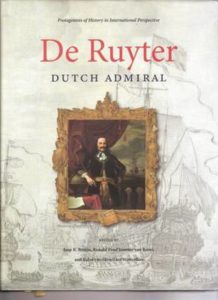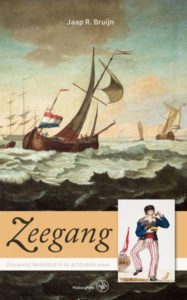Something for everyone
[Recensie] The introduction to this tome on Michiel de Ruyter starts of by stating that De Ruyter ‘is an individual of more than just Dutch national historical prominence’ (p. 7). This central notion underlines the entire volume, which consists of eleven contributions from nine different authors. They vary from more general contributions on the maritime world of the Dutch Republic to more specific contributions on, for instance, British perceptions of De Ruyter.[1] It is this diversity which makes De Ruyter. Dutch Admiral a pleasant read for the more generally interested reader who does not know an awful lot about De Ruyter or seventeenth century maritime warfare. The contributors themselves have an equally diverse background, with contributions coming from Denmark, Sweden, the United Kingdom, France, Morocco and of course the Netherlands. Not all of the authors can be categorized as professional historians, but all of them have experience in writing historical essays.
Although this is not a typical biography, as the editors themselves stress, it does feature De Ruyter as its main protagonist in all the contributions, thereby linking the diverse subjects. Some contributions focus more and others less on the person of De Ruyter, but all contributions deal with events or periods in history with which De Ruyter was involved in one way or another. It is, however, somewhat surprising that there is no chapter on perceptions of De Ruyter in Habsburg Spain. Of course, De Ruyter only came to prominence after the end of the Eighty Years’ War, but it would have been interesting to incorporate views from a non-belligerent nation with which the Republic until recently had been at war for so long. Nonetheless, the contributions offer plenty of other interesting information. What is more, all of them can be read as a standalone article, meaning that the reader can pick and choose the subjects he or she finds most interesting.
As for the contributions themselves, there are two articles which I would classify as necessary reading besides other more specific interests. The first is written by Jaap R. Bruijn, Professor emeritus at Leiden University on Maritime History. It offers an introduction to and general account of the maritime world of the Dutch Republic. In clear paragraphs Bruijn describes, for example, the functioning of maritime industries in the Republic, the mercantile marine and whaling. This article is very useful for those readers who are not necessarily knowledgeable on the maritime world of the Dutch Republic. The second article is that of Jan Glete, Professor of History at Stockholm University until 2009 when he passed away. It deals with the Dutch Republic as a Great Power and offers a description of its political interaction and its armed forces. In a concise way he gives an impression of the relative strength of the Republic’s army and navy compared to other political entities in the European theater, such as France and Britain. It also explains how the navy was organized in the time of De Ruyter and shows how the Admiralties obtained their resources. These articles, then, are very helpful in providing context and background for the other articles, which have a more specific focus.
Besides being a collection of interesting articles, one aspect of De Ruyter which is particularly noteworthy is the abundant use of colored illustrations. De Ruyter is, quite simply, stunningly illustrated with maps, paintings and sketches. What is more, these are not just for show, but actually illustrate the accompanying articles quite well. As for the text of the articles, most authors have made sure not to write overly large paragraphs nor are the articles themselves excessive in length.

De Ruyter. Dutch Admiral is surely not a definitive work on the person of Michiel De Ruyter. Then again, it is not intended as such, and the aims that are formulated in the introduction are surely met. De Ruyter offers a pleasantly varied account of the main maritime developments, events and protagonists that surrounded the person of De Ruyter. Novel is the approach of incorporating authors and perspectives from countries outside the Netherlands. However, there is an obvious downside to working with separate contributions. Precisely because of the diverse range of topics incorporated in De Ruyter, there is not much room for more in-depth accounts of these topics, meaning that the more knowledgeable person on seventeenth century maritime affairs might be disappointed with some contributions. Given the fact that De Ruyter is not the cheapest work around, this is certainly a serious consideration. However, for less knowledgeable readers, De Ruyter, with its range of contributions, pleasant reading and beautiful illustrations, offers bang for its buck. This book, in short, will look nice on any bookshelf.
—
Eerder verschenen op Hereditas Nexus
2015


